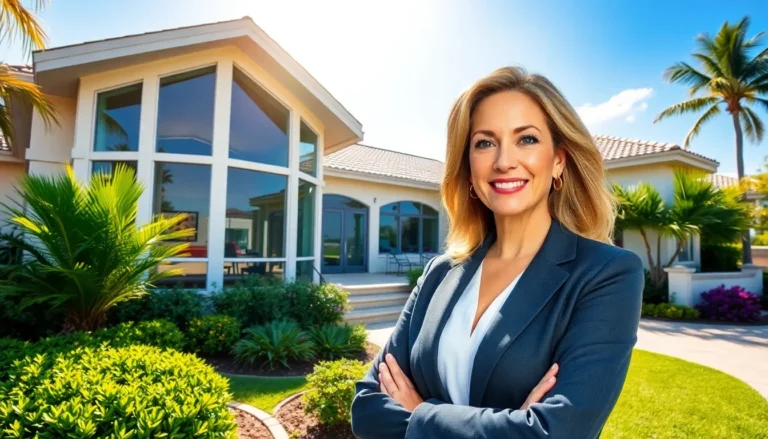Selling a luxury home isn’t just about slapping a “For Sale” sign in the yard and hoping for the best. It’s an art form that requires finesse, strategy, and maybe a sprinkle of magic. After all, when your property is worth more than some people’s entire life savings, you want to ensure it shines brighter than a diamond in a jewelry store.
Table of Contents
ToggleUnderstanding the Luxury Real Estate Market
Selling luxury properties requires insight into unique market dynamics beyond traditional real estate approaches. Knowing these intricacies helps agents target the right buyers effectively.
Key Characteristics of Luxury Homes
Luxury homes typically feature high-end finishes, expansive layouts, and premium locations. Buyers often expect gourmet kitchens, spa-like bathrooms, and smart home technology. Architectural design, including custom craftsmanship, also adds significant value. The inclusion of outdoor living spaces, pools, and landscaping enhances appeal, making properties desirable. Buyers also prioritize exclusivity, often seeking gated communities or properties with unique histories. These characteristics combine to create an even more compelling product for discerning buyers.
Trends Influencing Luxury Home Sales
Market trends significantly shape luxury home sales dynamics. Currently, an increase in remote work allows buyers to seek properties in luxury vacation destinations. Sustainability has become a focus; energy-efficient features and green certifications attract environmentally conscious buyers. Tech integration remains crucial, with smart home features becoming standard expectations. Investment potential also drives many decisions, as buyers view luxury properties as stable assets. Additionally, the age of buyers skews younger, with millennials more frequently entering the luxury market, influencing design and functionality preferences. These trends illustrate the evolving landscape of luxury real estate.
Preparing Your Luxury Home for Sale
Preparing a luxury home for sale involves careful planning and attention to detail. Effective strategies enhance appeal and attract the right buyers.
Staging for Success
Staging a luxury home enhances its visual appeal. Focus on creating inviting spaces that highlight key features, such as gourmet kitchens and spa-like bathrooms. Use high-quality furnishings and neutral colors to allow prospective buyers to envision their lives in the home. Strategically place mirrors to enhance the illusion of space and light. Incorporate fresh flowers or greenery to add warmth and vibrancy. Professional stagers can provide insights into current trends and preferences, optimizing the overall look.
Key Repairs and Updates
Addressing necessary repairs is crucial in the selling process. Prioritize fixing any plumbing or electrical issues, ensuring everything functions smoothly. Consider updating outdated fixtures, as modern appliances and finishes often attract buyers. Repainting walls in neutral tones can refresh the space and appeal to a broader audience. Enhancing curb appeal through landscaping improvements makes a strong first impression. Confirm that all renovations comply with local regulations to prevent future complications. Each small update contributes to a polished presentation, increasing the property’s market value.
Setting the Right Price
Establishing the right price is vital in selling a luxury home. A well-set price attracts serious buyers and avoids prolonged market presence.
Importance of Pricing Strategies
Pricing strategies significantly influence a luxury home’s appeal. Buyers often perceive value through pricing; setting it too high can deter interest, while pricing too low may raise suspicion about quality. Furthermore, understanding the luxury market’s nuances helps in formulating effective strategies that highlight unique features and accentuate value. Pricing competitively according to current market trends can draw in motivated buyers who appreciate the luxury segment. Sellers might consider seeking professional advice, as expert insights into pricing can enhance a listing’s visibility.
Conducting a Comparative Market Analysis
Conducting a Comparative Market Analysis (CMA) reveals crucial pricing insights. A CMA compares the luxury home with similar properties in the area, taking into account factors such as square footage, amenities, and location. This objective assessment ensures the home aligns with buyer expectations and market standards. Analysis of recently sold properties can provide benchmarks for effective pricing. Sellers should analyze current listings to understand competition and adjust accordingly. By leveraging data from a CMA, sellers position their luxury homes favorably in the market, attracting prospective buyers more efficiently.
Effective Marketing Strategies
Effective marketing strategies play a crucial role in showcasing luxury homes and attracting prospective buyers. A well-thought-out plan leverages multiple tools to create a strong presence in the market.
Utilizing Professional Photography and Videography
High-quality photography captivates potential buyers. Professional photographers understand how to highlight a property’s best features through lighting and angles. They can capture details that resonate with luxury home seekers, such as unique architectural elements and stunning landscapes. Videography adds another layer of engagement. Virtual tours allow buyers to navigate spaces remotely, providing an immersive experience that traditional listings lack. Drone footage showcases the property’s surroundings and enhances visual appeal, making the listing stand out in a competitive environment.
Online and Offline Marketing Channels
Employing varied marketing channels maximizes reach. Online platforms include real estate websites, social media, and targeted email marketing campaigns. Utilizing these avenues allows sellers to connect with a broad audience of potential buyers. Facebook and Instagram ads present the opportunity to showcase properties through captivating visuals. Offline strategies shouldn’t be overlooked. Hosting exclusive open houses or private showings caters to high-net-worth individuals and fosters personal connections. Additionally, collaborating with local luxury publications can elevate property visibility, ensuring it reaches discerning buyers who appreciate quality and exclusivity.
Choosing the Right Real Estate Agent
Selecting an experienced real estate agent is crucial for successfully selling a luxury home. Knowledge about luxury markets and client dynamics significantly enhances the selling process.
Qualities of a Luxury Home Realtor
Understanding the luxury market is essential for any realtor. Agents should possess proven expertise in selling high-end properties, showcasing an extensive portfolio of successful sales. Strong negotiation skills enable them to secure the best deals for sellers. Exceptional communication fosters trust and transparency throughout the selling process. Familiarity with local luxury trends and buyer preferences makes them invaluable resources. They should also leverage a robust network of contacts, including potential buyers and luxury influencers.
Questions to Ask Potential Agents
Ask about their experience specifically within the luxury market. Inquire about their marketing strategies tailored to high-value properties. Understand how they plan to price the home based on market data. Request insights about their negotiation tactics and past results with similar properties. Explore how they handle challenges such as lengthy sale periods or low interest. Lastly, gauge their familiarity with the community and local resources to ensure an optimized selling experience.
Negotiating Offers
Negotiating offers for a luxury home requires an understanding of the buyer’s motivations and effective strategies to secure favorable terms. Successful negotiations hinge on several key factors that impact the final agreement.
Understanding Buyer Motivations
Potential buyers often have varied motivations when seeking luxury properties. Many prioritize exclusivity and status, while others might seek investment opportunities. Buyers frequently desire serene environments or proximity to quality schools and employment hubs. Understanding these motivations allows sellers to present features that resonate with buyers’ aspirations. Sellers should also recognize that emotional connections often drive decisions in this market. Building a rapport and highlighting lifestyle benefits can significantly impact a buyer’s willingness to negotiate.
Strategies for Successful Negotiation
Employing effective strategies during negotiations can lead to successful outcomes. Firstly, transparency during discussions helps establish trust. Sharing recent improvements or unique aspects of the home may create leverage. Secondly, setting a realistic price range fosters an open dialogue between parties. Also, knowing when to compromise on contingencies can facilitate smoother negotiations. Alternatively, showcasing the competition can encourage urgency among buyers. Staying calm and composed while listening actively allows for better understanding and adaptability during discussions. These strategies collectively enhance the chances of achieving favorable offers in luxury home sales.
Selling a luxury home requires a blend of strategy creativity and market knowledge. By understanding buyer expectations and emphasizing the unique features of the property sellers can create a compelling narrative that resonates with potential buyers.
From effective staging to high-quality marketing and choosing the right real estate agent each step plays a vital role in the selling process. Additionally negotiating offers with insight into buyer motivations can lead to more favorable outcomes.
With the right approach luxury homeowners can navigate the complexities of the market and achieve successful sales that reflect the true value of their properties.




